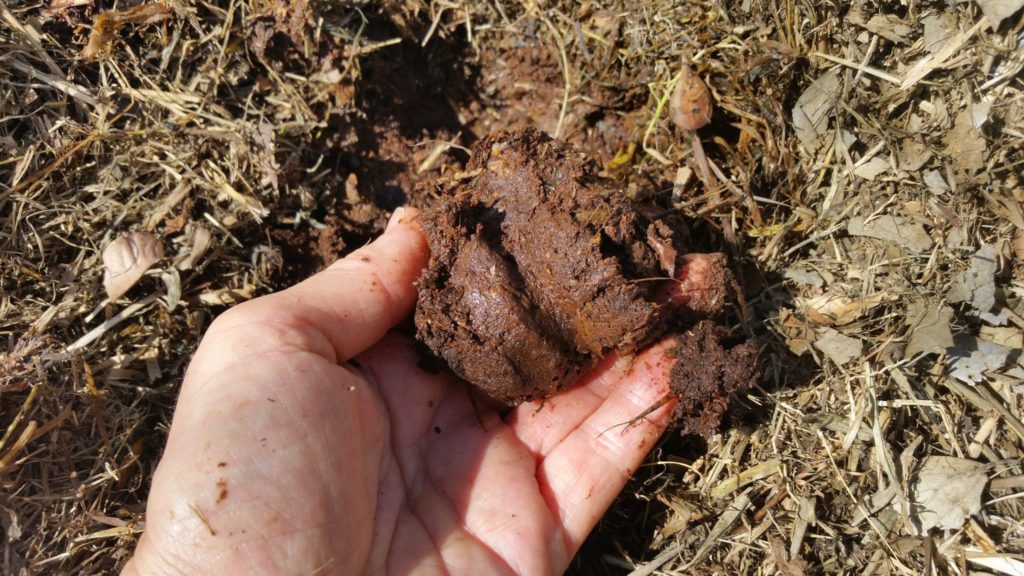What makes good compost? Compost is the result of a successively staged natural oxidation process that transforms heterogeneous solid organic matter into a homogenous fine particle, called humus.
But how do you know it is good? There are roughly 7 different elements required to make good compost:
- Plenty of Organic Matter, to provide energy for the decomposing organisms
- Nutrients, especially Nitrogen
- Oxygen, (with a few commercial exceptions)
- Water, but not too much nor too little
- Cations, especially Calcium to stabilize the compost
- A suitable pH range
- Temperature
Most of us only follow a few standard rules when composting in our backyard. These are:
Carbon-Nitrogen Ratio

You usually start with a 30 -1 ratio of Carbon to Nitrogen. The Carbon can be from any plant material that is shredded and small enough to increase its surface area for fungi & Bacteria to break it down into Compost.
This does NOT include any branches even though they are all Carbon. They are too large and need to be ground down into a lot smaller pieces by a mulcher in order to compost them quickly and effectively.
Preferably, you try to layer 4 inches of carbon to 3 inches of greens.
If you have too much carbon your pile will be dry and slow to break down. Too much nitrogen your pile may well be a big slushy mess.
In time this will sort itself out if you can tolerate the smell.
But if you get this ratio wrong in your veggie garden and have too much nitrogen the microbes will take nitrogen from the soil making it unavailable for your plants. That is why if you are making compost in a heap you should make sure it is fully decomposed before you place it around your plants.
Water

Composting organisms REQUIRE moisture to be active otherwise they go into a resting stage called spores. But the compost heap cannot be too wet or too dry so the organisms have an ideal environment to survive.
The heap may be too moist if the top is open & rain has saturated the heap.
Or too dry because it is too thin & drying out in the sun. Or you have too much carbon in the mix. There is a fine balance between being too wet or too dry that can take quite a bit of work to maintain. Covering a moist compost heap with a tarp will keep in the moisture, keep excess water out, and make your heap break down quickly without requiring water all the time to keep it moist.
Air

Air containing Oxygen must be mixed throughout the pile by turning the heap every 3 days. The outer layer of the compost that has cooled down can be alternated with the inner hot layer byt turning you compost pile. This allows Oxygen to penetrate throughout the heap. Without this constant turning, the heap will take a long time to break down. It will get very hot in the center of the pile preventing quick break down by the microbes as they can only survive at a certain temperature.
Too much air can also dry out the heap dehydrating the contents rather than decomposing them. Dehydrated contents make a mess in your garden if you are just tossing food waste on your garden bed. They need to be reconstituted with water to allow for proper decomposition in order to be converted to good compost.
So don’t let your heap dry out. This can be a tricky balance between being too wet or too dry. One can’t work because it is too dry. The other can’t work because it is too wet and often turns into a big stinky sludgy mess. This then requires carbon, to soak up the water and decrease the smell.
So turning your pile regularly and maintaining the moisture at just the right balance will add the necessary oxygen and moisture to keep your compost heap functioning correctly.
Seeds

It is not a good idea to add weed seeds to your compost heap unless the heat gets hot enough in the pile to destroy the seeds. Nutgrass is a particular problem in the compost heap and can be spread around the garden when you distribute and dig the mature compost into your soil.
I have personally found, rather than removing the nutgrass, I cover them with grass clippings every time I mow the lawn. The nut grass appears to die out as it can’t find the sun to reproduce. This has been an effective control for me as I don’t have time to dig them up and dispose of them whether it be in a bin or in the compost.
Some people put seeds from food waste in their council bins to separate them from the compost pile. This is too much work for me. I find it easier just to remove unwanted seedlings like pumpkin vines as soon as they sprout in your garden. Unless of course, you don’t mind if they take over your garden.
This happened to me and the end result – though I did get some lovely pumpkins out of the patch – smothered other plants and virtually killed them. And when I was removing the whole plant I accidentally killed some plants when I cut the vine as they were so entangled together.
But it is a great way to grow things without having to purchase seeds. It is just something you need to be aware of when composting.
But do all these things make good compost?

Well, that all depends on the nutrients available in the compost at the end of the composting process. Unfortunately, you can’t know exactly what nutrients are available without expensive testing and then you have to know what tests to ask for in order to know what is useful in that particular pile of compost.
On top of that, the nutrients shown in the test may not actually be available for the plant to use. They might be tied up chemically and inaccessible to the plant. Then the pH has to be right as well for the plants to access the nutrients. The pH is probably the most important factor that can be easily tested at home in your garden without the need for expensive soil tests.
For farming purposes, you must test your soil and/or compost to find out what is lacking in your soil in order to grow a particular crop.
But compost is one of the most important things to add to your soil as it stores and releases nutrients easier, holds water better, improves tillage, soil structure, and soil matrix. A must for every gardener.
What should I add to make my compost better?

If you really want to go to all the trouble and expense of trying to produce perfect compost (very difficult) then in addition to the usual compost mix of grass clippings, small mulched branches, shredded leaves, some vegetable waste, and other garden waste, you could add these ingredients:-
Additional Ingredients to make good compost
- Soil with a clay component – to hold nutrients and reduce nutrient loss
- Gypsum – to add sulphur essential to activate the nutrients on soil particles
- Rock Dust – can add up to 5%
- Rock Phosphate – for phosphorous – up to 5%
- Lime – a sprinkle unless the pH is too low.
- Wood Ash – but not too much or it will raise your pH too high
- Worm teas, comfrey teas, nettle teas
- Sawdust, used Hay, Straw, Lucerne
- Paper, Cardboard, Corn Stalks
- Manures, Blood, and Bone
- Anything free from your garden
Basically, anything that is biodegradable as long as you keep that carbon-nitrogen balance, water balance, aeration, and pH correct.
You can put meat products in your compost as long as you bury them deep enough to prevent rats and other vermin getting at them. But this can be tricky.
I personally find putting a Compot into your compost pile makes disposing of all your kitchen waste, (especially meat products), super easy. This way you can lock up your meat, dairy, eggs, and anything biodegradable inside your Compot inside your heap. The Soldier Flies will break down this non-worm friendly waste and add the juice to the compost mix.
This improves the overall nutrient content of your compost. It will bring the worms to the outside of your Compot to decompose all the worm-friendly waste and Soldier Fly Juice as it becomes available for the worms and thus improve your compost nutrient mix. Or simply plant a few Compots around your garden if you couldn’t be bothered with a compost heap, which generally speaking is a lot of hard work.
So what makes good compost?
In the end, don’t worry too much about your compost (unless it turns into a big smelly mess). It is still the best way to nourish your plants, dispose of waste, and help the environment even though each particular batch may not be perfect. But it does require large quantities of materials to produce a small amount of compost.
Understanding how all the elements in your soil and your compost interact with each other to produce great soil is a complex process that is even more complex to describe. But don’t let that stop you from having a go. Any compost is good compost.
Basically, it comes down to always mixing as many different materials as you can in your compost heap. This will ensure you have a pretty good chance of producing “good compost” that is nutrient rich to make your plants grow. And if you want a really easy way to compost green garden waste without the need for large compost heaps, then read the article on “Composting Scurvy Weed“. The method I use inside a pot plant container is fast, efficient, portable and simple. You can’t fail with this method plus it requires no hard work. Just keep topping it up, keep it wet, and empty every 3 months and start again. It is the easiest way I have used to compost green garden waste and weeds. Try it and find out for yourself.
What not to put in your Compost heap?

Gum leaves, as well as Pine needles, contain a chemical that stops any other seed from growing under that tree. This allows that particular tree to utilize all the available water and nutrients they need to grow and don’t have to share resources with other trees. The reason this is important is because these trees are usually found in dry, nutrient-poor areas where there is likely to be competition for any available water and nutrients.
For this reason, Gum leaves & Pine needles should NOT be added to a compost heap. Of course, there are all the other “usual” suspects that don’t work well in a worm farm or outdoor compost heaps such as Meat, Dairy, Eggs, Oil, Onions and any citrus waste. But you can put all these items in the eco-eze compot if you own a Compot and still be able to add these items to a regular compost bay or heap.
8 Methods of Composting
12 Things to consider when choosing a composter
http://agriculture.vic.gov.au
https://www.farmwest.com/
http://www.teravita.com
https://www.agweb.com
www.apal.com.au
Bob James
Lovel, H. 2014; Quantum Agriculture Biodynamics and Beyond; Quantum Agriculture Publishers; 2014



